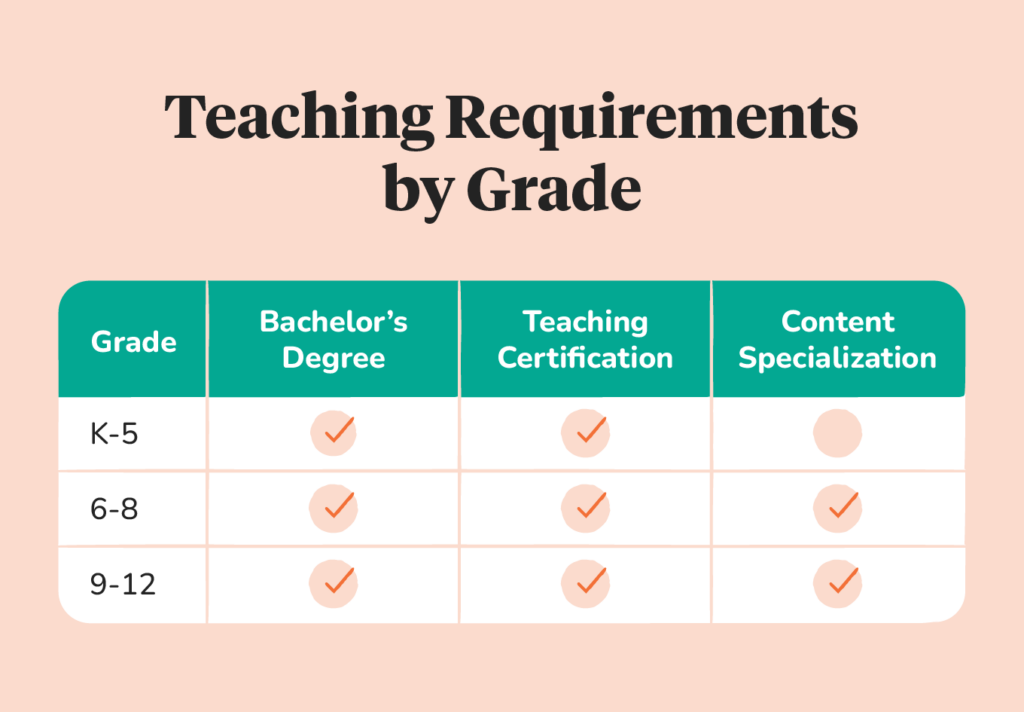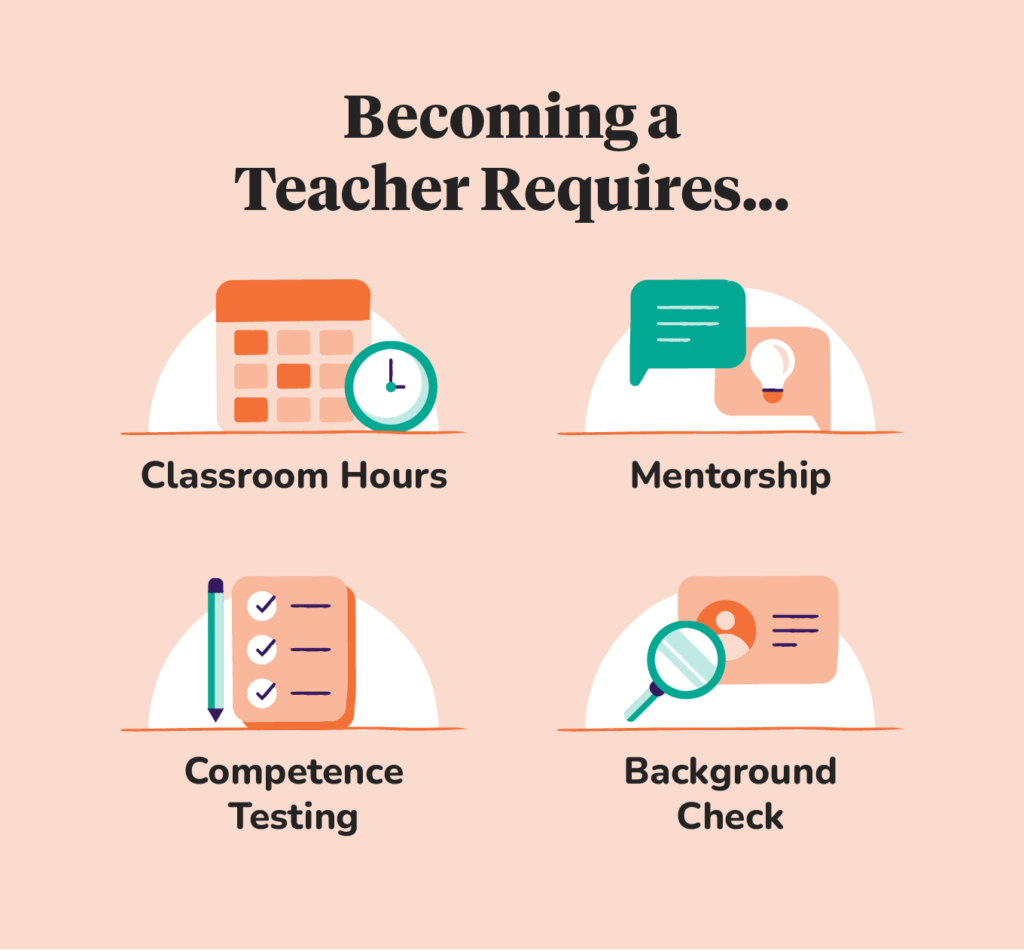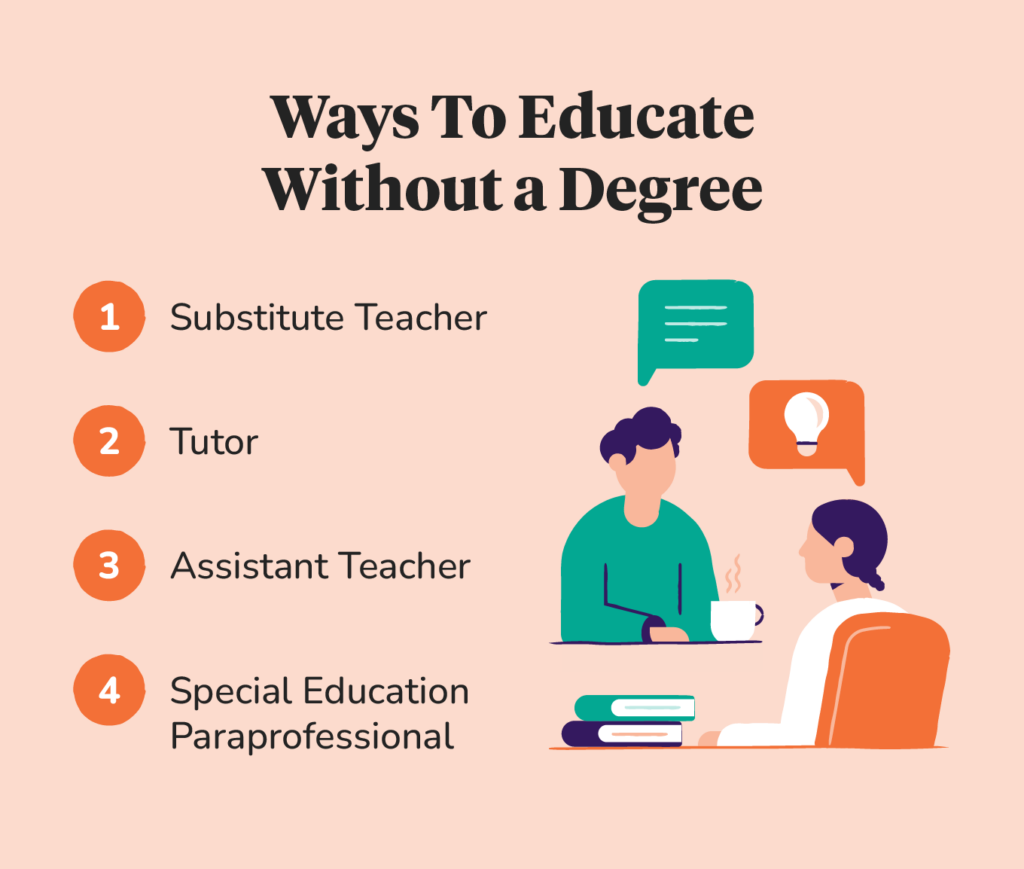Can You Be a Teacher Without a Degree?

Not everyone comes out of college knowing they want to be a teacher. For many, the calling to become a teacher comes later in life, whether it be from discontent in a current career or a new desire to be an educator.
So can you be a teacher without a degree in education? In fact, you can be a teacher in public schools without a bachelor’s degree in education, but you must have a bachelor’s degree in some subject and then pursue alternative teacher certification or a postgraduate degree in education. Finally, you must pass your state certification exam.
While each state has different requirements for becoming a teacher, a bachelor’s degree is necessary nationwide, with only a few states having exceptions for high-need areas.
In this post, we’ll break down the requirements to teach at each level, ways to become a teacher without a bachelor’s degree in education, and how you can still be an educator without a bachelor’s degree.
Requirements to Become a Teacher
While a bachelor’s degree is required to teach in public schools nationwide, you may need additional training depending on what age group you’re teaching. Remember that these requirements only apply to public schools. At most private schools, you can become a teacher with a specialized degree other than education.
If you’re teaching middle school or high school students, you will need some form of content specialization, as you’ll teach your expertise. For example, if you’re planning on teaching middle school or high school, you’ll likely need a:
- Bachelor’s degree in secondary education
- Bachelor’s degree in a teachable subject (ie: Biology, Mathematics, English, etc).
- Consult the chart below for teaching requirements at each level:

How To Become a Teacher Without a Bachelor’s Degree in Education
Just because you didn’t get a degree in education doesn’t mean you must rule out a career in teaching. You can still become a teacher in the public school system without an education degree. Two great ways to launch your career include:
1: Alternative Teacher Certification Programs
In most states, you can enroll in an alternate teacher certification program any time after you graduate. These programs certify prospective teachers who obtained degrees in a field other than education, and you can generally complete them in under a year.
These cost-effective programs are excellent ways to become a teacher quickly without the financial toll of a master’s degree — and you can take your courses online.
The 240 Certification, for instance, gets educators quickly certified to teach in Texas. While our program is tailored to each person, you’ll likely spend most of your time in the program taking courses that help you understand the fundamentals of education and their practical application. You will also begin work as a student teacher and will get support applying for jobs while you finish your remaining coursework.
2. Master’s Degree in Education
Combining your undergraduate degree with a master’s degree in education is a recipe for success if you’re looking to start a career as a teacher — especially in a specialized content area. Generally, if you go this route, you’ll receive a Master of Arts in Teaching or a Master of Education.
It’s important to mention that this route may not be viable for everyone as obtaining your master’s can be both a cost and time commitment. Masters Degrees can frequently cost more than $30,000, and you’ll also have to commit time to study for the GRE or complete a program that’s longer than a year.
Other Teaching Requirements
While the requirements for teaching differ from state to state, there are a few relatively consistent requirements nationwide. Some of these include:

Classroom Hours
You have to log hours in a classroom as a student teacher before getting hired full-time. Typically, you’ll be a student teacher during your final year of study if you’re part of a certification program.
During this part of the study, you’ll observe teachers at work, lead lessons yourself, and tutor students outside regular classroom hours.
Mentorship
Like student teaching, prospective teachers typically complete a mentorship with an experienced teacher before starting their teaching career.
The mentorship will involve regular sessions with a mentor who offers insight into different teaching styles, gives tips for first-year teachers, and extends advice on working within a faculty.
Competence Testing
Running a classroom can be a tough skill to master, and you’ll also need expertise in the subjects you’ll teach. Before becoming a teacher, you’ll go through competence testing, like responding to constructed response questions, to ensure you can teach whatever subjects you’ll be responsible for.
Background Check
You must pass a background check before you become a teacher. While certain schools may have different systems for these requirements, a screening will almost always be required. A background check safeguards against serious issues, such as past convictions or pending criminal cases.
How To Teach Without a Degree
Even if you don’t have a bachelor’s degree, there are still ways you can educate and build relationships with students. Some other paths you can take to be an educator include:

Substitute Teacher
While requirements differ from state to state, a bachelor’s degree in education is not always required to be a substitute teacher.
Responsibilities differ from classroom to classroom regarding substituting, but you may find yourself leading detailed lesson plans while also keeping control of the classroom. If you’re still unsure if teaching is right for you, stepping in as a substitute is a great way to see if you feel comfortable leading a class.
Tutor
If you have expertise in a subject, you can work for yourself as a tutor.
Tutors can create relationships with students without fully committing to a career as a teacher. If you think you may want to be a teacher, tutoring weekly — or even monthly — can help you polish your teaching skills and provide some insight into whether teaching is right for you.
Assistant Teacher
Assistant teachers help with administrative tasks, reinforce lessons in the classroom, and help students grasp topics.
As an assistant teacher, you’ll spend time in a classroom and foster relationships with students. If you don’t have a degree, assistant teaching is a great route for those who still want to spend time in a classroom setting
Special Education Paraprofessional
As a special education paraprofessional, you’ll support a certified special education teacher. Your responsibilities may include tutoring special education students outside of regular classroom hours or assisting students individually or in small groups.
Working with a certified teacher in special education is a great way to gain mentorship and make a difference in students’ lives, even if you’re not certified. Working in this role can also provide insight into whether or not you want to obtain certification later in your life.
Frequently Asked Questions
Becoming a teacher without a degree can be complicated, so prospective teachers may naturally have more questions. Here are a few of the most common questions and answers about becoming a teacher without a degree.
What Certifications Do I Need To Become a Teacher?
The certifications required to become a teacher vary from state to state. Consult our state-by-state guide to see what your state requires.
How Many Years Does it Take To Become a Teacher?
The total time it takes to become certified to teach is generally four to six years. This includes the four years it takes to obtain a bachelor’s degree plus the year or two to pass your certification exam and log the required amount of classroom hours.
What States Can You Teach in Without a Degree?
Some states grant temporary licenses to teach in high-need areas — even if candidates don’t have a degree. These states include:
- Arizona
- California
- Kentucky
- Mississippi
- Missouri
- Texas
- Wisconsin
Can You Become a Teacher in One Year?
Whether through a one-year master’s program or an alternative certification program, you can become a teacher in one year. Through 240 Certification, you’ll finish your coursework and pass your test, all while participating in your first year as a student teacher.
How 240 Tutoring Can Help
If you’re debating changing careers or looking to jump from substitute teaching to full-time, 240’s Certification Program can equip you with the tools to become a teacher quickly and confidently.
Let us create a custom plan tailored to your goals that sets you up for success. Apply today.



